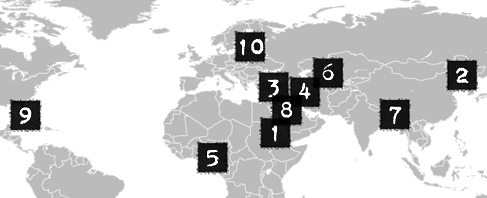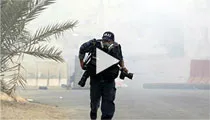The Kingdom continued severe censorship of any critical reporting, taking special measures to obstruct coverage of protests in Eastern Province calling for political reform and greater rights for the country’s Shia minority. Foreign and local journalists were forbidden to enter the province, where demonstrations had begun in February 2011. Imprisonments ticked up during the year. In February, the authorities arrested three online journalists reporting on Eastern Province protests and blocked their news websites. During the same month, a former columnist faced death threats for Twitter postings detailing an imaginary conversation with the Prophet Muhammad. He was later jailed on blasphemy changes that could bring the death penalty. Restrictive laws suffocate independent coverage in traditional media, a sector in which editors are government-appointed. Beginning in 2011, online journalists became subject to the same harsh controls that apply to traditional news media. Self-censorship is widespread, and international news outlets operating inside its borders limit their reporting in order to maintain accreditation.
Saudi Arabia
» Government continues to restrict coverage of protests in Eastern Province.
» Kingdom is among the most censored nations in the world, CPJ finds.
The Kingdom continued severe censorship of any critical reporting, taking special measures to obstruct coverage of protests in Eastern Province calling for political reform and greater rights for the country’s Shia minority. Foreign and local journalists were forbidden to enter the province, where demonstrations had begun in February 2011. Imprisonments ticked up during the year. In February, the authorities arrested three online journalists reporting on Eastern Province protests and blocked their news websites. During the same month, a former columnist faced death threats for Twitter postings detailing an imaginary conversation with the Prophet Muhammad. He was later jailed on blasphemy changes that could bring the death penalty. Restrictive laws suffocate independent coverage in traditional media, a sector in which editors are government-appointed. Beginning in 2011, online journalists became subject to the same harsh controls that apply to traditional news media. Self-censorship is widespread, and international news outlets operating inside its borders limit their reporting in order to maintain accreditation.
-
8th
Most Censored country -
4
Imprisoned on December 1 -
30,923
Seeking execution -
5.2
Million Facebook users
CPJ ranks Saudi Arabia among the 10 Most Censored Countries in the world. The authorities have the right to appoint and fire senior editors in traditional media. Regulations require government registration and approval of editors for any organization or individual conducting "electronic journalism" or "displaying audio and visual material" on websites.

| 1. Eritrea 2. North Korea 3. Syria | 4. Iran 5. Equatorial Guinea 6. Uzbekistan | 7. Burma 8. Saudi Arabia 9. Cuba | 10. Belarus |
The detainees include three Web managers whose news sites covered political unrest in the Eastern Province: Habib Ali al-Maatiq, a photographer who supervised the website Al-Fajr Cultural Network; Hussein Malik al-Salam, a photographer who helped manage the site; and Jalal Mohamed al-Jamal, who managed the website Al-Awamia. No charges were publicly disclosed. Hamza Kashgari, a journalist imprisoned for his Twitter postings, was also being held.
A Facebook page calling for the execution of imprisoned journalist Hamza Kashgari attracted more than 30,000 members. Kashgari, a columnist for the Jeddah-based daily Al-Bilad, came under fire after posting comments on his Twitter account that described a fanciful conversation in which he addressed the Prophet Muhammad as an equal. He faced charges in late year of "disrespecting God" and "insulting the Prophet," which could bring the death penalty upon conviction. More than 25,158 people signed a petition seeking his release.
February 6: | Kashgari posts an imaginary conversation with the Prophet Muhammad, igniting a wave of condemnation from Saudi clerics and social media users. Six hours later, he deletes the posts. |
February 7: | Facebook group is created that demands his execution. The columnist flees Saudi Arabia in fear for his life, traveling to Jordan, the United Arab Emirates, and eventually Malaysia, according to news reports. |
February 9: | CPJ puts out an alert calling for the authorities to ensure his safety. |
February 12: | Malaysian authorities arrest Kashgari less than a week after his arrival and extradite him to Saudi Arabia, where he is taken into custody. |
Although the authorities heavily censor the Internet, blocking tens of thousands of websites, Saudi Arabia has one of the highest rates of Facebook use in the region, according to Facebook statistics. The social media network provided one of the few ways for news about the Eastern Province to reach the outside world.

